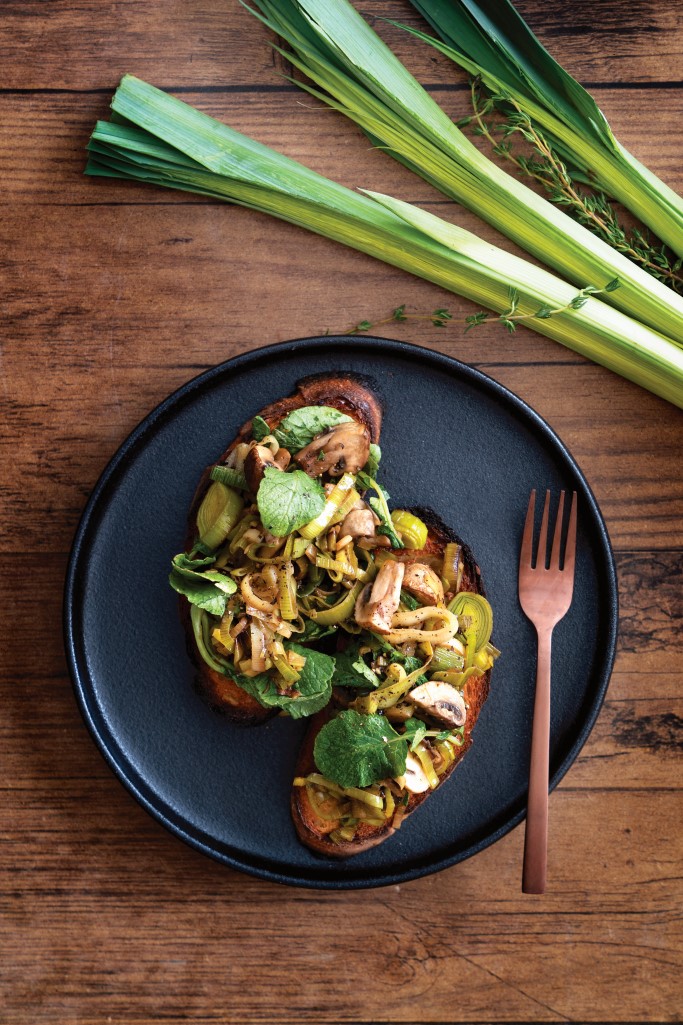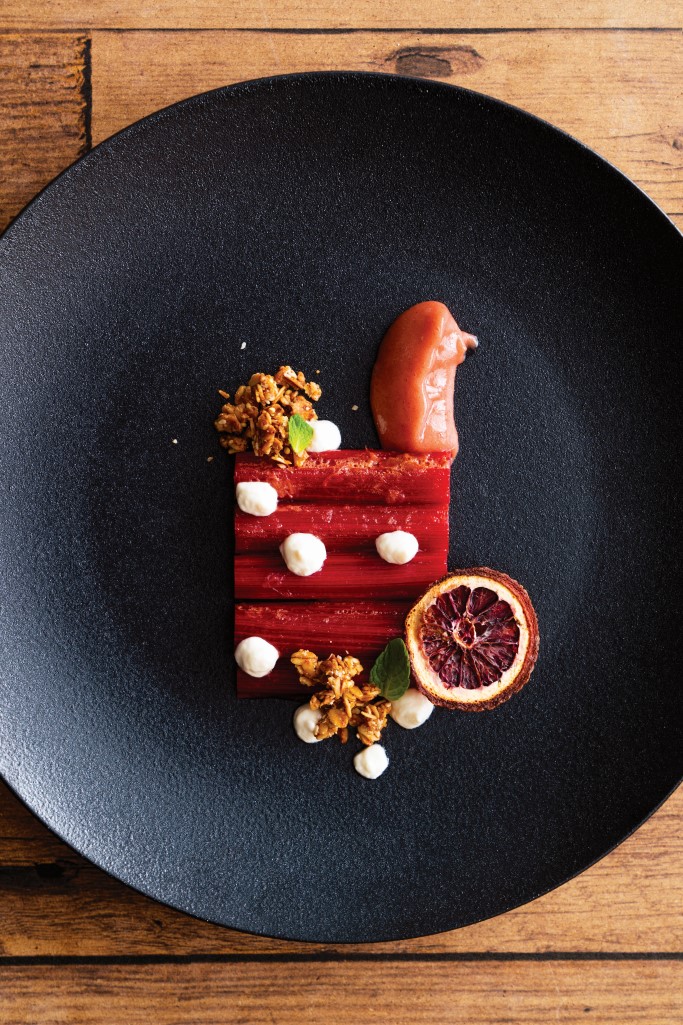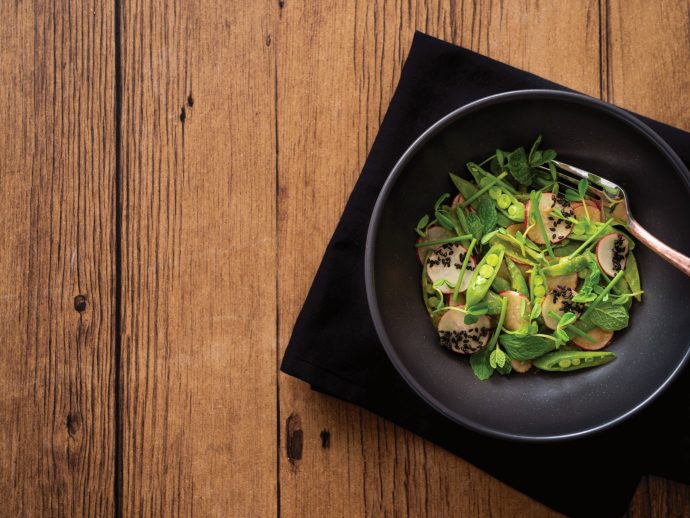Sustainable recipes you’ll love
More of us than ever are coming to understand the links between the food we eat and its impact on the planet. Eating a diet rich in legumes and organic vegetables, with a reduced emphasis on meat, is recognized as being better for us and the planet. Read on to discover delicious recipes that will help you include more sustainable ingredients in your meal plans.

Watercress is relatively disease and pest resistant, so it doesn’t require pesticides. It’s easy to grow, and it’s packed with nutrition.
1 Tbsp + 1 tsp (15 mL + 5 mL) olive oil, divided
10 mushrooms, mixture of white and brown, cleaned and diced, about 2 cups (500 mL)
2 thyme sprigs
1/4 tsp (1 mL) salt, divided
1 Tbsp (15 mL) lemon juice
1 leek, trimmed, quartered, and diced, about 1 1/2 cups (350 mL)
1 tsp (5 mL) honey
1 cup (250 mL) watercress
2 pieces of whole grain or sourdough bread
Black pepper, to taste
In large skillet on high, heat 1 Tbsp (15 mL) olive oil. When oil is hot, add mushrooms and thyme sprigs and cook for about 5 minutes, shaking pan from time to time to toss, but otherwise keeping movement to a minimum. Once mushrooms are browned, add a pinch of salt and lemon juice, stir through, and tip out onto plate to rest.
Reduce heat to medium and, in the same pan, add remaining 1 tsp (5 mL) olive oil, leeks, and remaining salt. Cook leeks, being careful not to brown, for about 5 minutes, or until just soft. Tip mushrooms and thyme sprigs back into the pan, add honey, and combine with leeks. Remove pan from heat.
Toast 2 pieces of bread. When ready, add watercress to still-warm leek and mushroom mixture and mix through, just wilting watercress. Spoon onto toasted and plated bread and season with black pepper.
Serves 2.
Each serving contains: 238 calories; 7 g protein; 11 g total fat (1 g sat. fat); 29 g total carbohydrates (6 g sugars, 5 g fiber); 495 mg sodium

Symbiotic bacteria called Rhizobium invade the roots of lentils and legumes such as peas and beans, allowing them to “fix,” or use, nitrogen. This also improves the quality of the soil they grow in.
1 cup (500 mL) black beluga or French Puy lentils
1 bay leaf
1/4 cup (60 mL) green peas
1/4 cup (60 mL) finely sliced cilantro
1/4 cup (60 mL) finely sliced parsley
1/4 cup (60 mL) finely sliced mint
1/4 cup (60 mL) red wine vinegar
1 Tbsp (15 mL) olive oil
1/4 tsp (1 mL) salt
3 green onions, finely sliced
1 cup (500 mL) baby spinach
Pick over lentils, removing pebbles or debris, and rinse. Bring a large pot of water to boil and add lentils and bay leaf. Reduce to medium-low and cook lentils at a slow simmer for 20 minutes, or until tender but not mushy. Drain and rinse with cool water to stop the cooking process.
In separate pot, blanch green peas for 2 to 3 minutes; drain and rinse with cool water.
In small bowl, combine herbs, vinegar, olive oil, and salt.
In large bowl, place cooked and cooled lentils. Pour dressing overtop lentils; add green onions, peas, and baby spinach; and toss together. Tip out onto large shallow platter to serve.
Serves 4.
Each serving contains: 95 calories; 5 g protein; 4 g total fat (1 g sat. fat); 11 g total carbohydrates (1 g sugars, 4 g fiber); 162 mg sodium

Selecting seasonal fruit reduces the need for heating, refrigeration, artificial lighting, pesticides, and increased transport. While rhubarb’s season may be short, the plant is a perennial that can produce for years.
2 cups (500 mL) rhubarb, cut into 1 in (2.5 cm) pieces
1 thumb-size piece of gingerroot, cut into 3 or 4 chunks
1 cinnamon stick
Large mint sprig
1/2 cup (125 mL) orange juice
1/2 cup (125 mL) water
1Tbsp (15 mL) honey
Preheat oven to 375 F (190 C).
In shallow 10 x 10 x 3 in (26 x 26 x 8 cm) baking pan, arrange rhubarb in one layer. Cut ginger in 3 or 4 chunks and add to pan along with cinnamon stick and mint sprig.
In small bowl or jug, mix together orange juice, water, and honey. Pour over rhubarb mixture.
Place baking tray in preheated oven and poach for approximately 20 to 30 minutes. Rhubarb is done when it is fork tender but still retains its shape. Serve over porridge or granola, or use as a dessert topping or cake filling.
Serves 2.
Each serving contains: 86 calories; 2 g protein; 0 g total fat (0 g sat. fat); 21 g total carbohydrates (15 g sugars, 2 g fiber); 8 mg sodium
By Helena McMurdo

